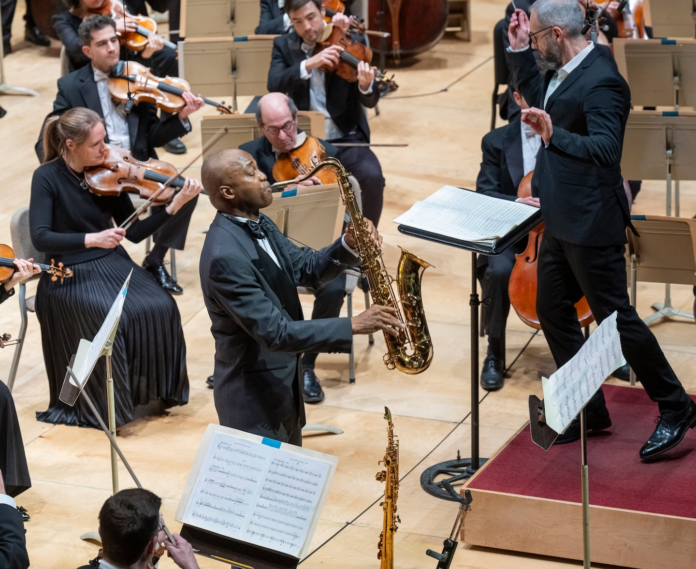In the second half, there was Brahms’s Symphony No. 2, a treasure of the orchestral repertoire. On the podium for all of it was Finnish conductor Dima Slobodeniouk, a regular guest at the BSO and one of the few conductors I’d go out of my way to see. So with no good reasons at the ready, it seems one must consider the disheartening ones.
Boston classical audiences have a reputation for being stiff-necked Puritans, which isn’t entirely without basis in reality. The modern first half of the program might have prompted some more standard repertoire-minded listeners to skip this week, but it wouldn’t be fair to say that BSO audiences are averse to contemporary music as a whole. If you ask me, the answer might be found not in the who and what, but the when and why.
This season so far, I’ve gotten more messages than ever before from friends who had no idea the BSO was playing something they had reason to be interested in. However, scrolling through Instagram lately, I almost invariably see ads for Holiday Pops but few to none for the BSO, which still has two weeks of concerts before its December hiatus. As the old saying goes, you can lead horses to water but you can’t make them drink, but it seems like maybe only a select group of horses are being led to the spring in the first place.
León appeared on stage in an eye-catching blazer the color of moonlight to introduce her haiku-inspired orchestral piece, “Time to Time,” demonstrating a few stark Noh theatrical gestures that were quickly reflected in the percussion once the piece began.
The introduction evoked a sense of solemn ritual welcome, as the strings descended in a silvery haze before a solo clarinet introduced a leaping melodic gesture with avian agility. The specific Basho poem that inspired “Time to Time” describes observing the moon, but listening to the actual piece felt more like stargazing during a meteor shower. One must resolve to take in the whole experience, whether meteors appear or not. There weren’t many meteoric moments during the piece, but the stars shone brightly.
Slobodeniouk has led consistently excellent performances of standard symphonic repertoire during his previous visits to the BSO, and Thursday’s Brahms Symphony No. 2 continued that pattern. His gestures on the podium tend to be sweeping, but there’s rarely a sense of bravura or showiness to them, and he draws a different sound from the ensemble than Nelsons, more translucent but no less substantial. With that approach applied to Brahms’s emotional wringer, Thursday’s performance was the stuff that grabs you by the collar and shakes you: Romanticism at its finest.
But if I was going to convince someone to buy a ticket, I’d tell them about saxophonist James Carter’s dynamite showing in Sierra’s Concerto for Saxophones and Orchestra. The BSO has played this piece on only one previous occasion, also with Carter, a one-off concert in 2019 conducted by Thomas Wilkins. Carter was incredible then, and he’s possibly even more so now.
Sierra wrote this piece for him; the composer has compared Carter to the legendary violinist Paganini, but a more contemporary classical analogue might be pianist Yuja Wang, who attracted a much larger crowd to Symphony Hall a few weeks ago. Both are unassailable technical virtuosi as well as entertainers with quietly wicked senses of humor. They treat music with the irreverence that only comes from inside-out knowledge of a subject. Winkingly, he gasped through a few splashy, scratchy runs up towards the highest attainable notes of the saxophone, at last landing on an angelic high D.
The first movement’s technical ordeal was his playground, as he imitated a twanging surf rock guitar, a foghorn, and James Brown’s scream at the beginning of “I Feel Good,” all within the space of a few breaths.
The dreamy second movement set his soprano sax singing over a lolling, lush chord progression that at first sounded like it could have been ripped from an 80s power ballad, until he intoned a familiar melody for a few seconds — Pachelbel’s Canon strikes again!
The crowd demanded an encore, and he pulled out the same one he played last time he was here: “Lift Every Voice and Sing,” a song often referred to as the Black national anthem, arranged by Carter into an avant-garde fantasia. A few people tried to sing along and quickly gave up.
BOSTON SYMPHONY ORCHESTRA
Nov. 14. Symphony Hall. Repeats Saturday. 617-266-1200, www.bso.org
Subscribe To Our Newsletter
[contact-form-7 id="4" title="Contact form 1"]



